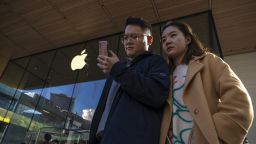Meng Wanzhou, the senior Huawei executive whose detainment in Canada became a flashpoint ofUS-China tensions, returned to the corporate stage Monday as sanctions continue to slam its business.
The chief financial officer’s first appearance since her release came at an earnings presentation in Shenzhen where she took questions from reporters. The Chinese tech giant said that it made 636.8 billion yuan ($99.9 billion) in revenue in 2021, down nearly 29% from the previous year.
“We managed to survive 2021,” the company’s rotating chairman, Guo Ping said. “[But] our fight to survive is not over yet.”
Profits, however, soared to 113.7 billion yuan ($17.8 billion), surging about 76% year-on-year. That marked a significant improvement on 2020, when profits ticked up just over 3%.
“Despite a revenue decline in 2021, our ability to make a profit and generate cash flows is increasing,” Meng said in a statement. “We are more capable of dealing with uncertainty.”
She also alluded briefly to her personal ordeal, saying that during her time away, the world had “changed so much.”
“Over the past six months, I’ve been learning and trying to catch up,” said Meng.
Legal battle
Meng returned to China last fall after a long-running extradition battle with the United States,where she and Huawei had been charged for alleged bank fraud and evasion of economic sanctions against Iran.
The executive, who is also the daughter of Huawei founder Ren Zhengfei, was arrested in December 2018 at the behest of the US government, and spent almost three years under house arrest in her multimillion-dollar home in the city amid the proceedings.
Meng’s legal troubles strained relations among China, the United States and Canada, especially after Beijing detained two Canadians following her arrest — a move widely interpreted as political retaliation. Beijing has repeatedly denied it was holding them as political hostages.
Meng was allowed to return home last September after reaching an agreement with the US Department of Justice to defer her prosecution until late 2022, after which point her charges could be dropped. Meng pleaded not guilty to charges including conspiracy to commit bank fraud and wire fraud. However, as part of the deal, Meng admitted to misrepresenting Huawei’s relationship with an Iranian subsidiary.
Hours after her release, the two Canadians detained by China, Michael Kovrig and Michael Spavor, were also freed.
Upon her homecoming, Meng was greeted as a hero in Shenzhen, where Huawei is headquartered.
‘Survival’ mission
In recent years, Huawei has been increasingly hit by US sanctions, cutting off the company’s ability to obtain critical components for its devices.
US policymakers have long claimed that Huawei poses a national security risk, alleging that the Chinese government could use the company’s equipment to spy. The company has repeatedly denied those allegations, and tried to improve its standing in Washington.
Huawei has been forthcoming about the resulting damage. In 2020, it declared that “survival” was the goal, with “nonstop aggression from the US government” stifling operations.
Its smartphone business — once world leading — has been hit particularly hard as its ability to obtain chips continues to be impacted.
In response, Huawei has leaned into other areas. It reported growth in sales of other consumer gadgets, such as wearable tech, and said that industrial use of its 5G technology had proven to be a bright spot.
But Huawei, which is privately held, did not disclose the current state of its operations in Russia, where it launched a 5G project last year.
Asked about the crisis in Ukraine, Guo said that “our sympathy goes out to people suffering from this conflict, and we have seen that countries are looking for solutions.”
“Just like every one of you, we hope to see a ceasefire and end of the war as soon as possible,” he said, without commenting further.
— CNN’s Nectar Gan and Clare Duffy contributed to this report.










